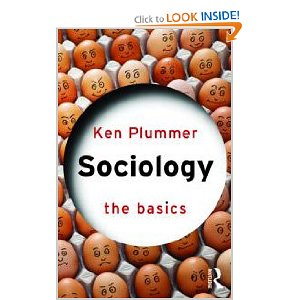My Introduction To Sociology no comments
I have chosen the topic of cryptography on the web and the disciplines of sociology and politics/political science (still undecided).
I decided the best way to start the process of research was to avoid looking at my topic in much depth and focus on grounding my knowledge in the two disciplines I’ve chosen. My reasoning was that this would better allow me to think about the cryptography within the context of my disciplines rather than read cryptography first and then need to refresh my understanding within new contexts of my chosen disciplines.
Whilst I am still undecided as to whether I will choose political science (a more theoretical approach to the nature of politics) or simply politics (closer to political history) but I am certain of my decision to examine the discipline of sociology. Having previously been heavily cognition/neurology oriented within psychology and less socially minded I felt this was a perfect opportunity for self development and so the choice of sociology was a ‘no-brainer’. Whilst psychology might be often associated with sociology, being that they are both social sciences, my particular psychological background means sociology is by all means a good distance outside my comfort zone.
I searched initially for “undergraduate sociology reading list[s]” and located an undergraduate reading list from City University London, University of Warwick and Brunel University London all of which touted Ken Plummer’s Sociology: The Basics as providing a sturdy foundation for undergraduate students. As such, this has been my first textbook on the topic of sociology.
 The book establishes a basic description of sociology as a lens through which to view, examine and interpret the world. It is noted that “social” in sociology can have two similar but distinct interpretations. The first interpretations is “social” meaning the social ‘entity’ or ‘agent’. The second interpretation recognises “society” as a cumulative entity comprised of multiple agents. To make an analogy; this is the difference between describing the ways in which individual birds in a flock are influenced by their surroundings and describing the seemingly single entity that all the birds, moving together, appear to form.
The book establishes a basic description of sociology as a lens through which to view, examine and interpret the world. It is noted that “social” in sociology can have two similar but distinct interpretations. The first interpretations is “social” meaning the social ‘entity’ or ‘agent’. The second interpretation recognises “society” as a cumulative entity comprised of multiple agents. To make an analogy; this is the difference between describing the ways in which individual birds in a flock are influenced by their surroundings and describing the seemingly single entity that all the birds, moving together, appear to form.
In this way sociology offers two key opportunities. The first is to discuss issues such as the nature of culture, religion, ethics and any facet of social life in an both an abstract and society wide sense. The second is to allow for observations to be made of the ways these abstract concepts may influence the social world of the individual agents. In this way the discipline of sociology appears to be inherently interdisciplinary in and of itself; drawing on everything from medicine to theology in order to adequately represent the complex nature of social interactions.
I have encountered several topics of interest that I will research further:
Modernity: the discussion of the sociology of “modern” societies. In particular the idea of “multiple modernities”: as societies have advanced together technologically many have diverged in their modernisations forming new cultural and societal differences. The ways in which these differences interact with differing modernisation is the subject of this specific approach.
Discourse/Discourse analysis: The approach of analysing communication. This can be done from a variety of perspective to achieve ends. These ends include making theories about the interactions of humans or to further contextualise cultural expression within a wider societal context.
I am looking into what politically oriented undergraduate text would offer the strongest foundation and have identified several potential candidates using a similar approach of consulting University undergraduate pre-/reading lists:



